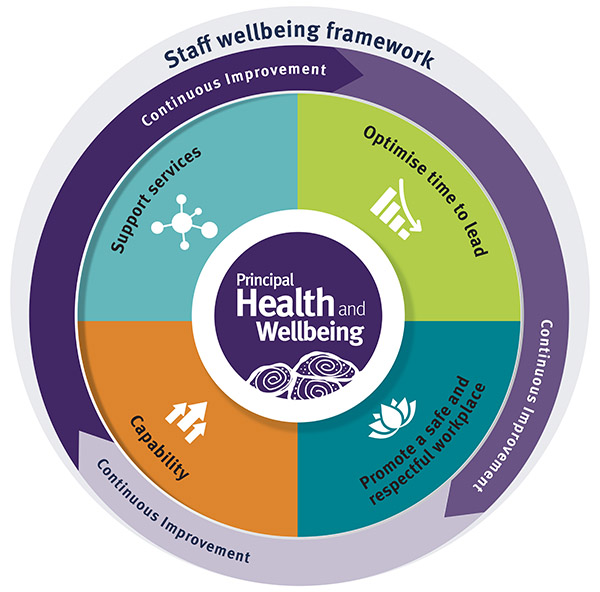Health and wellbeing at work
As part of the department's commitment to supporting staff health and wellbeing, this page provides information to help staff manage their wellbeing and implement a staff health and wellbeing program at their workplace. There are a number of tools, resources and information sources provided to assist you.
Planning a staff wellbeing program
Staff wellbeing programs have contributed to reduced absenteeism, increased morale, enhanced team and social work relationships, and improved physical and mental health.
The planning process includes the following steps:
- management commitment—gain support from your principal/manager
- wellbeing planning—form a committee
- needs assessment—gather information about your staff and workplace
- action plan—plan your program
- evaluation—check that your program worked.
Wellbeing dimensions
Wellbeing dimensions are different aspects or elements of wellbeing. When planning a wellbeing program, consider strategies to address different dimensions. The 5 dimensions are:
- physical wellbeing
- psychological wellbeing
- social and community engagement
- occupational wellbeing
- financial wellbeing.
Wellbeing programs do not need to be costly. Programs often work most successfully when you use the skills and interests of staff members and make connections with local community people, organisations, resources and programs. It is recommended that wellbeing activities are selected based on staff and workplace needs.
The staff intranet (OnePortal) contains comprehensive information and a step-by-step guide to help staff plan an effective wellbeing program for their workplace. Search for 'staff wellbeing' on OnePortal for more information.
Other staff wellbeing resources
The department has a comprehensive staff wellbeing framework that includes multiple initiatives, information resources and interactive training modules.
Our aim is to empower staff to adopt healthy behaviours and help create work environments that support health and wellbeing.
Regional Wellbeing Coordinators
Seven Regional Wellbeing Coordinators (RWCs) provide support and assistance to schools in implementing staff wellbeing initiatives.
The RWCs utilise best practice approaches including the 5-step process in the staff wellbeing planning guide and staff wellbeing framework, to assist schools within their region to plan, implement and evaluate staff health and wellbeing initiatives to improve the health and wellbeing of staff.
To find out more, search 'Regional Wellbeing Coordinators' on OnePortal.
Principal Health and Wellbeing

A pie chart that has the 'Principal Health and Wellbeing' heading in the core that provides continuous improvement under the staff wellbeing framework to the 4 key pillars below:
- optimise time to lead
- support services
- promote a safe and respectful workplace
- capability.
As a department, we have a strong focus on the wellbeing of all staff and students to create a sense of belonging and a positive environment for teaching and working.
Principal and school leaders are pivotal to schools achieving excellence in teaching and learning. Our priority is to ensure the leaders of our Queensland State Schools are healthy and well, feel valued and are socially connected through strong collaborative partnerships, so that they can continue to lead with strength and purpose and stay focused on creating supportive learning environments.
The Principal Health and Wellbeing (PHW) team provide targeted services and identify system-wide initiatives to improve principal and school leader wellbeing within Queensland state schools and centres.
For more information about principal and school leader health and wellbeing in the department, email
PrincipalWellbeing.SSS@qed.qld.gov.au.
Principal Hotline and Conflict Resolution service
An initiative of Principal Health and Wellbeing, the Principal Hotline and Conflict Resolution (PHCR) team delivers a unique state-wide service for Queensland school leaders that provides targeted support and assistance on health and wellbeing matters that arise in their leadership role, and for conflict and complex matters that arise with parents/carers and community.
For more information, departmental employees can search 'Principal Hotline and Conflict Resolution' on OnePortal.
Capability programs
Through the Education Futures Institute (EFI), the PHW team offers a suite of capability programs to enhance and build skills and knowledge in understanding and navigating conflict behaviour in adults, and in improving staff health and wellbeing.
The programs are delivered by our nationally accredited mediators, as well as leading educational partners, and are available to Queensland state school and regional staff.
For more information about the programs and to register, visit the EFI Catalogue, contact our team at CapabilityPHW@qed.qld.gov.au or contact your regional EFI team.